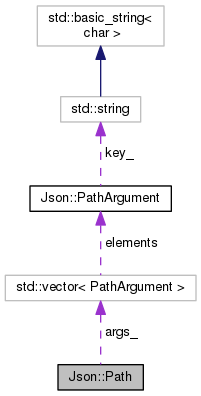Experimental and untested: represents a "path" to access a node. More...
#include "json.h"

Public Member Functions | |
| Path (const std::string &path, const PathArgument &a1=PathArgument(), const PathArgument &a2=PathArgument(), const PathArgument &a3=PathArgument(), const PathArgument &a4=PathArgument(), const PathArgument &a5=PathArgument()) | |
| const Value & | resolve (const Value &root) const |
| Value | resolve (const Value &root, const Value &defaultValue) const |
| Value & | make (Value &root) const |
| Creates the "path" to access the specified node and returns a reference on the node. More... | |
Private Types | |
| typedef std::vector< const PathArgument * > | InArgs |
| typedef std::vector< PathArgument > | Args |
Private Member Functions | |
| void | makePath (const std::string &path, const InArgs &in) |
| void | addPathInArg (const std::string &path, const InArgs &in, InArgs::const_iterator &itInArg, PathArgument::Kind kind) |
| void | invalidPath (const std::string &path, int location) |
Private Attributes | |
| Args | args_ |
Experimental and untested: represents a "path" to access a node.
Syntax:
|
private |
|
private |
| Json::Path::Path | ( | const std::string & | path, |
| const PathArgument & | a1 = PathArgument(), |
||
| const PathArgument & | a2 = PathArgument(), |
||
| const PathArgument & | a3 = PathArgument(), |
||
| const PathArgument & | a4 = PathArgument(), |
||
| const PathArgument & | a5 = PathArgument() |
||
| ) |

|
private |

|
private |

Creates the "path" to access the specified node and returns a reference on the node.

|
private |




|
private |